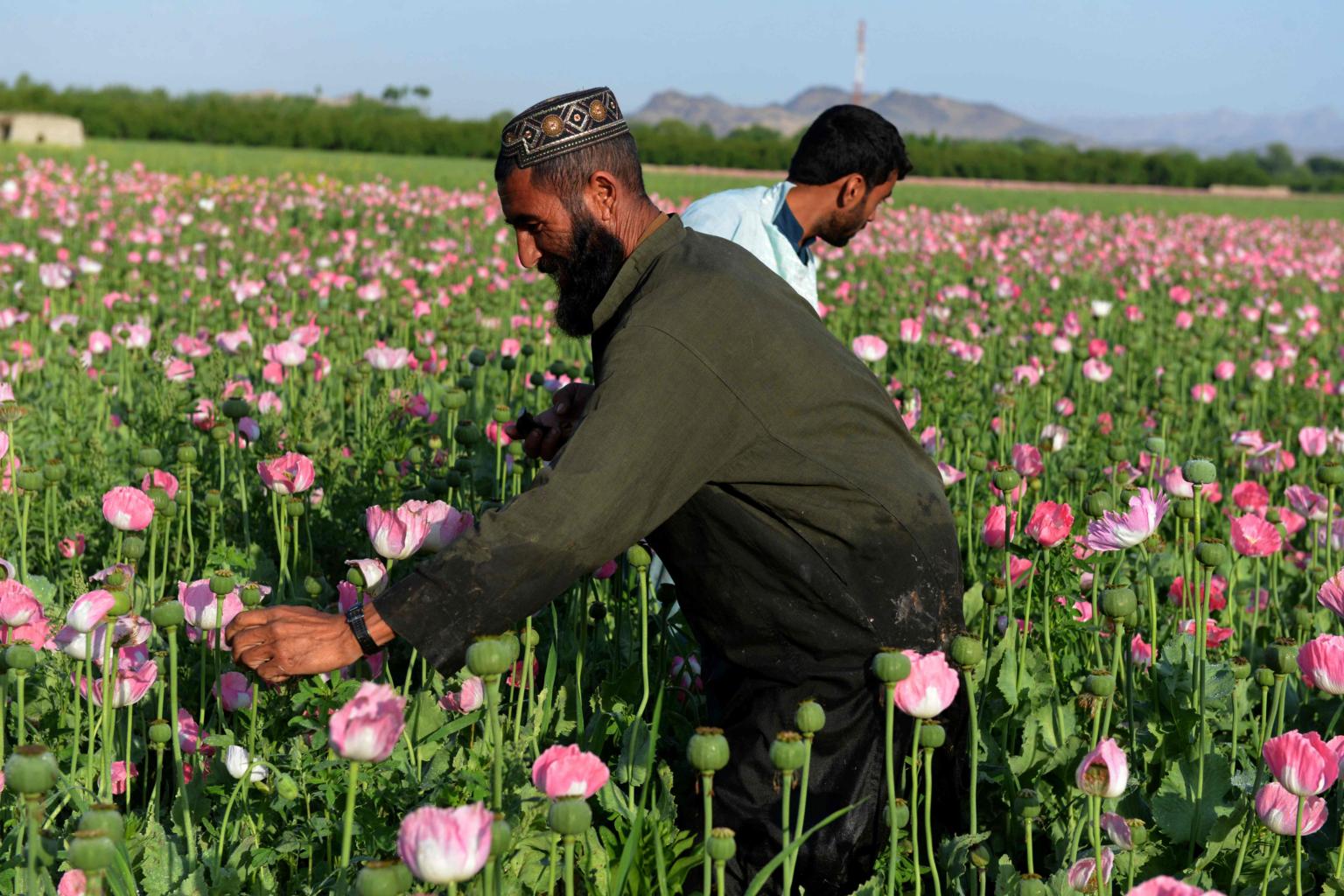Afghanistan's farming families head to the fields as annual poppy harvest begins
Sign up now: Get ST's newsletters delivered to your inbox

Afghan farmers harvest opium sap from a poppy field in Zari District of Kandahar province on April 12, 2016.
PHOTO: AFP
Follow topic:
ZHARI, Afghanistan (REUTERS) - In Zhari, a parched district north-west of Afghanistan's second city of Kandahar, 13 year-old Naqibullah is working in his father's poppy field, preparing for the main harvest of the year.
Harvesting the poppy and collecting the resin that will be used to make opium, heroin and other drugs that eventually find their way on to world markets is a labour-intensive business and boys as young as six are hard at work in the fields.
"There is no school or madrasah (religious school), so I have to help my father in the poppy field and work with him,"Naqibullah said.
Afghanistan is the source of much of the world's illegal opium and the crop forms a vital part of the economy of the southern part of the country, despite years of efforts to eradicate cultivation and replace it with other crops.
"I have 20 members in my family, I have to feed them," said Naqibullah's father, 60 year-old farmer Haji Janan. "We are poor people, we have lots of problems in our village, there is no hospital or electricity."
Dry conditions that led to crop failures in the arid, semi-desert regions where much of Afghanistan's opium crop is harvested helped cut cultivation and production sharply last year but eradication campaigns have had only a mixed impact.
Taleban insurgents are known to benefit from the crop in some areas by taxing farmers and opium traders.
Police and government officials are also believed to be deeply implicated at all levels of the trade and Mr Haji Janan even said a delegation of elders from the area had obtained consent from high-ranking officials to complete the harvest.
"They have given us permission to harvest our fields this year because of our hardship," he said.
Establishing the truth of such assertions is difficult and the claim is rejected by Mr Ali Shamsi, deputy governor of Kandahar province, who says that eradication operations have been held up by problems with the central government.
In Zhari district, almost 5,000ha were devoted to opium cultivation last year, almost a quarter of the total in Kandahar province. Just 180ha were eradicated, according to the 2015 Afghanistan Opium Survey by the United Nations Office on Drugs and Crime (UNODC).
"We are continuously in contact with the Ministry of Counter Narcotics asking them to provide us capability, funds and assets to start the anti-narcotic campaigning in Kandahar province as quickly as possible," Mr Shamsi said, blaming problems at the ministry for the failure to start eradication.
A spokesman for the ministry in Kabul rejected the comment. "We have our organised plan for eradication in Kandahar province," said Mr Hanif Danishyar, a spokesman for the ministry.
"Yes, there has been cultivation in Zhari district but we will eradicate the fields," he said.
Cultivation in Kandahar province declined by almost 40 per cent last year, according to UN estimates, part of a nationwide drop of almost a fifth in the amount of land growing opium.
But the fall was more down to crop failures than any eradication campaign, the UNODC said.
Kandahar is well known for its vegetable and fruit cultivation including pomegranates, grapes and plums and Afghanistan's Western backers have long tried to coax farmers into replacing opium with legal crops.
Zhari is one of seven Kandahar districts targeted for assistance in the three-year Kandahar Food Zone Program backed by USAid, which aims to create alternative livelihoods for opium farmers and funding agricultural infrastructure including greenhouses and irrigation canals.
Mr Shamsi says the US$28 million programme, including agriculture, irrigation and other assistance backed by international donors was having an effect.
"We have already implemented alternative projects in those districts where poppy was cultivated before," he said.
But outside in the fields, many farmers remain to be convinced. "We have to cultivate poppy," Mr Haji Janan said.

